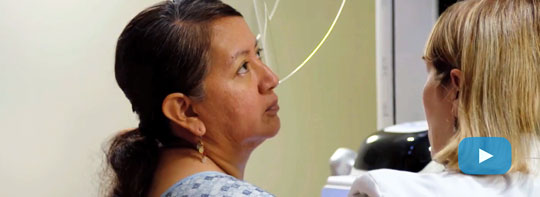
PORTLAND, Ore., April 1, 2016 — Latina women were nearly twice as likely to be screened for breast cancer after they were visited in their homes by trained community health workers, known as Promotoras, according to a study published in Cancer Epidemiology, Biomarkers and Prevention.
The Latina Initiative: How Kaiser Permanente is Reducing Disparities in Breast Cancer Screening
Kaiser Permanente is collaborating with Susan G. Komen Oregon and Southwest Washington, and eight community partners to increase breast cancer screening among Latina women in Oregon. As part of The Latina Initiative “Poder y Vida” (Power to Live) project, Kaiser provides free mammograms to eligible Latinas, and donates the treatment for the women who are diagnosed with breast cancer. The program started in 2013, and so far more than 1,000 women have received free mammograms and six are being treated for breast cancer.
Watch the Video
Breast cancer is the most common cancer among women in the United States and the leading cause of cancer death among Hispanic women. Hispanics are more likely than non-Hispanic whites to be diagnosed with breast cancer at later stages when the cancer is more advanced and resistant to treatment. There are many reasons for this, including lower levels of education, limited access to health care, lack of health insurance and no consistent primary care provider.
“Promotora visits are essential in educating Latina women about the importance of breast cancer screening,” said Gloria Coronado, PhD, lead author and cancer disparities researcher at the Kaiser Permanente Center for Health Research in Portland, Oregon. “Our study showed a modest, but significant increase in screening rates. We are encouraged by these findings, and must continue to involve patients, clinics and communities in efforts to further reduce the inequity in breast cancer screening.”
In Coronado’s study, the Promotora visits boosted screening rates nearly 8 percentage points. More than 19 percent of Latina women who received the visits at home completed a mammogram within a year, compared to 11 percent who did not receive a visit.
“This research goes a long way toward understanding how to reduce disparities and improve care for our vulnerable populations,” noted Ricardo Jimenez, MD, study co-author and medical director of Sea Mar Community Health Centers.
The study examined the “Fortaleza Latina” (Strong Latina) program, which recruited 536 Hispanic women, ages 42 to 74, from four Sea Mar Community Health Clinics located in the Seattle area. Researchers used electronic medical records to verify that the women had not had screening mammography during the previous two years. The women completed surveys at the beginning of the study in 2011 and at its end in 2014.
Eighty percent of the women were born in Mexico, and 92 percent preferred speaking Spanish. Slightly less than half were employed, and the majority earned less than $20,000 a year. Most had completed less than eight years of formal education, and nearly three-quarters lacked health insurance.
The women were randomly selected to receive visits from Promotoras or receive their usual care, which may have included reminders from their primary care providers that they were overdue for a mammogram. The Promotoras received at least three days of training on the use of motivational interviewing techniques as well as health information regarding breast cancer and the importance of mammograms. >
The community clinics had some mammography resources on-site or nearby, mostly using wheeled-in mammography units. Two of the clinics added mobile mammography vans to make screening more accessible, but the vans did not boost overall screening rates.
The authors say the study illustrates the importance of including peer-to-peer education as part of an overall strategy to reduce the disparity in breast cancer screening.
Additional authors include: Shirley A.A. Beresford, Donald L. Patrick and India Ornelas from the Fred Hutchinson Cancer Research Center and the University of Washington, Department of Epidemiology, in Seattle; Dale McLerran, Sonia Bishop and Beti Thompson from the Fred Hutchinson Cancer Center; and John R. Scheel from the University of Washington, Department of Radiology, and Seattle Cancer Care Alliance.
About the Kaiser Permanente Center for Health Research
The Kaiser Permanente Center for Health Research, founded in 1964, is a nonprofit research institution dedicated to advancing knowledge to improve health. It has research sites in Portland, Oregon, and Honolulu, Hawaii. Visit kpchr.org for more information.
About Kaiser Permanente
Kaiser Permanente is committed to helping shape the future of health care. We are recognized as one of America’s leading health care providers and not-for-profit health plans. Founded in 1945, Kaiser Permanente has a mission to provide high-quality, affordable health care services and to improve the health of our members and the communities we serve. We currently serve more than 10 million members in eight states and the District of Columbia. Care for members and patients is focused on their total health and guided by their personal physicians, specialists and team of caregivers. Our expert and caring medical teams are empowered and supported by industry-leading technology advances and tools for health promotion, disease prevention, state-of-the-art care delivery and world-class chronic disease management. Kaiser Permanente is dedicated to care innovations, clinical research, health education and the support of community health. For more information, go to: kp.org/share.